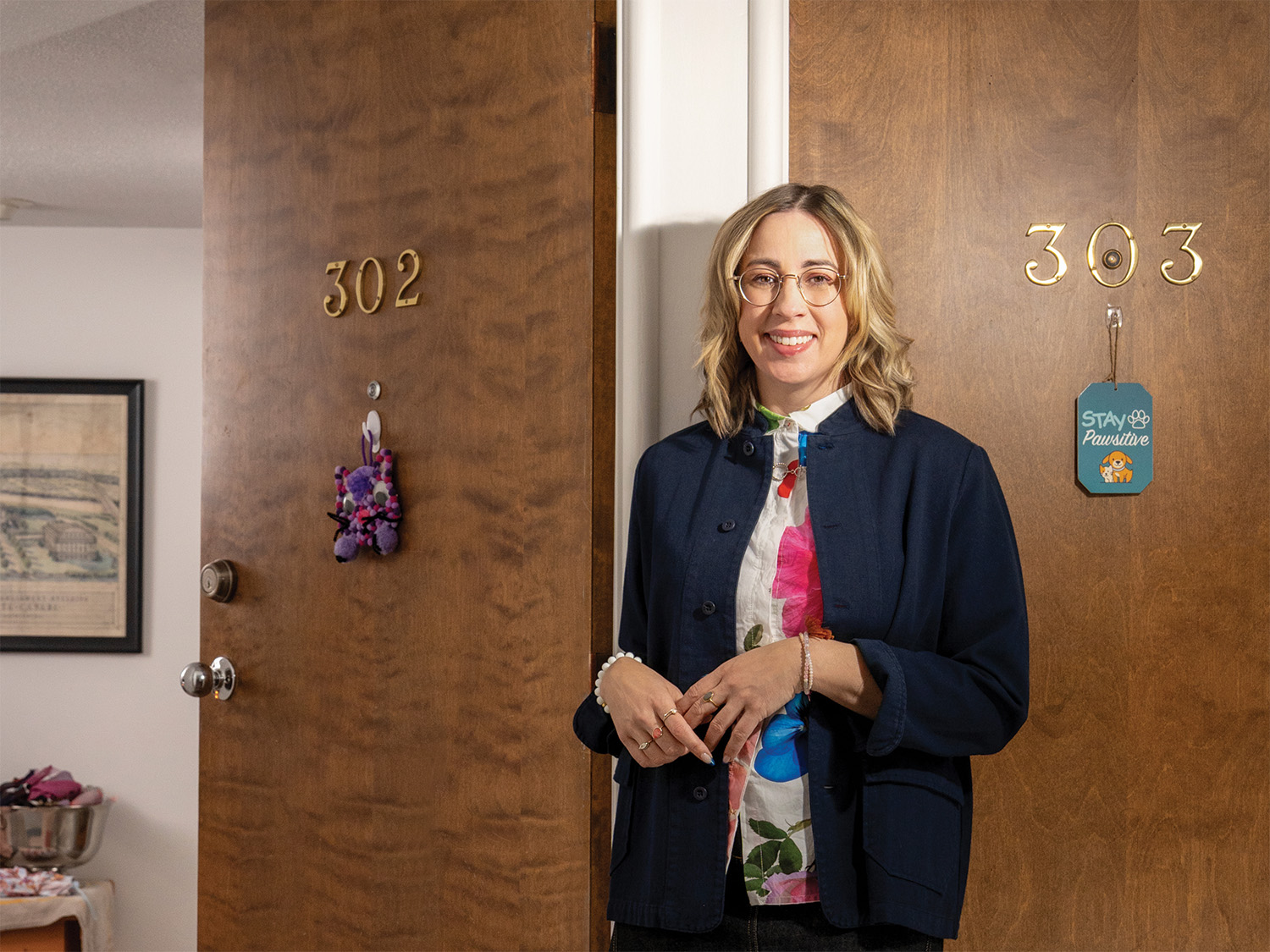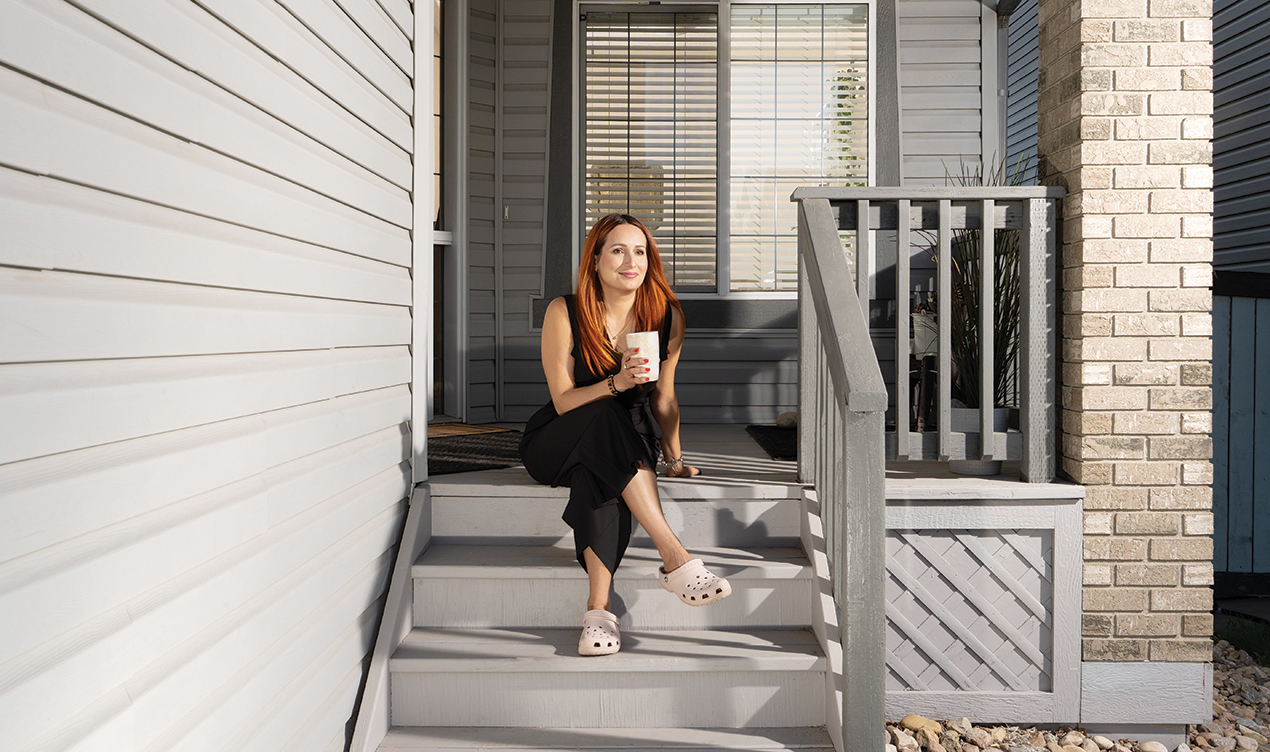
Melissa Bourgeouis‘ great reset started before the pandemic. In 2019, the family lawyer was in a long-term relationship, successful in her career with her own practice, and getting ready to settle down. The next step, according to traditional logic, was to buy the home. Renting in a downtown apartment, Bourgeois and her partner were looking at options for sale in central Edmonton, hoping to maintain their convenient urban lifestyle. They considered downtown — which, thanks to a cooling condominium market, had never been more affordable to buy in — but feared it could be a bad investment for that same reason. Instead, they prepared to pay more for a house.
But life started throwing curveballs her way. First, the relationship came to an end, and with it, the likelihood that she could buy a centrally located home. Then, after moving into her own apartment, COVID-19 put further stress on her life by bringing the world to a standstill and keeping her cooped up in her 495-square-foot unit. She had to take a moment to pause and reconsider.
“I didn’t know where I was going to go, or what was next for me,” says Bourgeois. “It was a free fall.”
She called the small 29th-floor apartment her sky palace — a liminal space where she could reconsider every aspect of her life, from relationships to the limits of her practice. She had mixed feelings about the traditional confines of family law, which came with long hours and less positive results. She could no longer stomach it.
She’d already been travelling to London to learn from a unique legal model that allowed a single lawyer to represent both parties in an amicable divorce. Once travel restrictions loosened, she was able to continue travelling back and forth between continents before asking the law society for permission to pilot this novel law practice in Canada — the first of its kind in the country. Through all of this, it was not lost on her that this flexibility would be unattainable had she been tied to homeownership. Her idea of “settling down” completely transformed — and she’s not alone.

As home prices skyrocket across Canada, Edmonton’s market has remained comparatively stable, earning it a reputation as one of the most affordable of Canada’s largest urban centres, according to a Canadian Mortgage and Housing Corporation report. Thanks to a seemingly endless amount of space (and political will) to expand its boundaries, homeownership has long been the norm, not the exception, for much of the middle class.
And yet, more Edmontonians who could absolutely afford homeownership are saying no, preferring instead the benefits of a flexible lifestyle with set monthly expenses. “The rental market is becoming more important,” says Damian Collins, housing expert and human geographer at the University of Alberta. “It also may question some of our cultural understandings of what it means to be a successful household.”
Whereas we used to spend more of our lives in one career path, in one city, and in just a handful of homes, change is now the norm. We’re also increasingly open to shifting careers, according to an Express Employment Professionals–Harris Poll study. What’s more, fewer Canadians are having children. According to Statistics Canada, the fertility rate has been on the decline for 15 years, hitting a new all-time low in 2023, reducing the need for more living space and, by extension, the need to buy a house. The result is fewer pressures keeping the average person locked into a home, and the choice to move cities, upgrade, or downsize has never been easier.
“It could be argued that we’re moving to more flexible lifestyles, for better and for worse, perhaps,” Collins says. “We don’t necessarily have the same job security. We don’t have the same security of homeownership that we used to. But we do have greater flexibility that can come with that.”
Collins also says that as renting becomes more popular, and more Canadians become renters, there needs to be more protections in place. In Edmonton, the high demand for rentals increased the cost by 20 per cent between 2021 and 2024. Unlike other provinces, where there are more protections for renters, there is no limit to how much landlords can increase rent in Alberta (although they can only do it once a year). Collins says that putting a cap on the yearly rent hike is necessary for renters rights.
Developers are also responding to this shift. Katie Schneider, a development manager for Autograph — one of the city’s most active downtown developers — says that as lifestyles change, so does their business. Affordability is one factor, but the great shift to working from home has had huge impacts on rental design.
“Now we’re thinking about units that actually function for being able to spend all day inside your unit,” says Schneider. Before the pandemic, the idea of being within walking distance of everything meant you didn’t need as much in your unit. But that’s changed. “If you, in the pandemic, were stuck with a cohort that didn’t serve you, it was kind of miserable, right? So what we’re finding is that in our buildings, we aim to foster a sense of community,” she adds.
But anticipating renters’ needs isn’t easy in an unstable environment. “The volatility and uncertainty of the world
is impacting how people are making decisions,” Schneider says. “Think about where we’ve come from 2020 till now and knowing that if we built a building in 2020 it’s surely going to be different in 2026.”
Speaking personally, Schneider, who’s spent six years with the company, says the climate just “feels uncertain” for making investments right now. “Buying a home right now, it feels like an unpredictable kind of thing. That impacts rental, and people’s rental decisions and then how we think about these buildings.”
But for some, like branding and marketing consultant Anna Bohdanowicz, renting isn’t just a necessity — it’s a long-term strategy for stability and peace of mind. She lives in Magrath Heights in the southwest and enjoys a yard, a garage, and a multigenerational home she rents with her parents and two kids. It’s the perfect layout for now. Once her kids move out, she’ll downsize and won’t need to worry about selling as a renter. In the meantime, her focus is on her day job and making memories with her family.
Bohdanowicz and her parents split the cost, which helps them get more bang for their buck. For her parents — Polish immigrants who spent most of their careers in Kuwait where foreigners can’t own land — it’s nothing particularly new. But even after so many years of building their professional careers in Canada, they still prefer the renters’ life. Evidently, so does their daughter.
For Bourgeois, renting isn’t a step back — it’s a step toward living on her own terms. If her old dream was a home in Westmount, the new dream became a character apartment in Westmount, living above local shops and eateries. It’s a spacious, open-concept place with a ’70s California vibe — very Melrose Place. She can easily stroll to her office in the morning, pick up fresh groceries on the way home and cap off the day with a craft brew and a doughnut from her favourite local spots. Bourgeois embraces a lock-and-leave lifestyle, trusting her landlord to keep things running smoothly while she’s away. When she travels, which is often, she walks out the door with everything else handled. Flexibility lets her choose the job, the city, the life. And if what she wants changes, it’s no sweat. “I was kind of able to build my life by design,” she says.
In theory, Bourgeois could enjoy all the features of her carefully designed life and build equity. That was certainly the “sell” to many Edmontonians in the early 2000s who bought into the idea of condos as entry-level homeownership. With down payments as low as $12,000 and mortgages about equal to or less than average rental fees, why would you, as they say, “pay someone else’s mortgage?”
But people are beginning to understand that owning a condo is not the same as owning a house. Instead of one party charting the course and making maintenance decisions, condo owners must work with every other owner in the building. It requires the same kind of long-term planning that owning a house does, if not more, all with unpredictable costs, such as rising condo fees and dreaded special assessments.
“That’s going to throw their financial situation totally upside down,” says Dylan Kelley of Twenty8 Capital, an Edmonton developer whose work also includes “reconversions” — that is, buying up entire condo buildings and turning them into rentals. Sometimes, they even end up renting them back to the sellers. “Why would somebody want to be locked in for the next 10 years?”
The idea of reconversions came to him after the father of a family friend passed away, leaving behind a series of condos he had intended as a nest egg for his family. But they were bleeding money. What started as a boon quickly became a burden. “He worked his fingers to the bone to support the family,” Kelley says. “And to just see that dwindle away was an eye-opener for me. That’s when I first thought something’s not right here.”
Indeed, Edmonton condo prices have plummeted over the past decade, reflected in a 17.8 per cent drop in median price according to Royal LePage. While Toronto condo prices more than doubled in the same period, Edmonton owners watched their properties lose value — deterring buyers rather than attracting them. That lack of confidence in ownership has reshaped the housing market, slowing condo construction while fuelling a surge in purpose-built rentals.
Last year broke records for new housing construction in Edmonton, with homes built for ownership and units built for rent reaching nearly the same total. Canadian Mortgage and Housing Corporation data shows a slight edge for ownership over rentals (6,453 starts over 6,307 starts), but the difference between the two has never been narrower.
Bohdanowicz was a new homeowner a decade ago, back when she was married. During her separation, she sat down to run the costs. In just three years, she’d spent over $20,000 on just property tax and home insurance. She didn’t even add up how much it cost to repair the boiler tank. And the fence and roof were going to be next.
“I realized, my God, I’m just going to spend my children’s entire childhood fixing things and living in anticipation that something is going to go wrong.”
Ditching homeownership felt like lifting a weight. No more YouTube tutorials on fixing toilets. No more surprise costs. Instead, she works with a financial advisor, invests part of her steady income, and saves the rest for travel. Last year, they went to Portugal. This year, it’s the Dominican Republic.
A house is an investment, she admits. But for her, to buy a house now would mean having to sell it after her kids moved out. If interest rates hike up or a recession hits and she couldn’t make payments, Bohdanowicz’s house and all its value could just be taken. “You don’t really own a home until you pay it off.”
This article appears in the June 2025 issue of Edify








